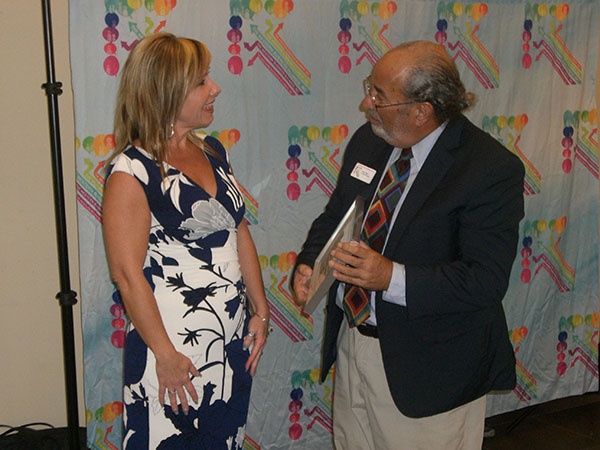
BY CRAIG CAMPBELL
Members of the Western Business Alliance gathered for a quarterly business luncheon Tuesday, Oct. 24, at the Madison Green Clubhouse. Michelle Hillery, deputy film commissioner of the Palm Beach County Film and Television Commission, was the featured speaker.
Hillery started 20 years ago as an intern with the FTC and has worked her way up through the organization to the point where she is now responsible for day-to-day operations. She’s currently in charge of programs relating to tourism, including management and oversight of budgets, marketing, policies and procedures, production history, advertising, public speaking and recruiting.
Her talk focused on how the film and television industry generates interest and business in Palm Beach County, and how the FTC facilitates productions in the area.
“I feel the Film and Television Commission is one of the best film offices in the world,” Hillery said, adding that the FTC’s customer service is the main reason why she feels so strongly about the organization.
The FTC’s primary service for production companies that are interested in the area for filming is the free, online, one-stop permitting process. Permits are issued for public property — such as parks, beaches, streets, sidewalks, public buildings, etc. — within 34 film-friendly municipalities and taxing districts in Palm Beach County through the office. She pointed out that the FTC also has a comprehensive database of filming locations in the county for those who are interested in a specific setting for their production.
The FTC is financed from revenues generated by the Palm Beach County Tourist Development Tax, which is collected on any unit rented or leased for six months or less. The tax supports the promotion of tourism, beach restoration funding, art and cultural events and professional sports facilities in Palm Beach County. The FTC benefits from the tax, as does the Palm Beach County Sports Commission and numerous cultural entities, such as museums and the Palm Beach Zoo.
Hillery said film and television production generates $200 million in annual revenue in Palm Beach County, and has raised a total of $2.7 billion in the 20 years that the FTC has been in existence. “For every dollar of tax revenue that goes to the FTC, $206 in spending is returned to the county through the film and television industry,” she added.
Another aspect is how movies and TV shows stimulate tourism. “Visit Florida’s research reported that 23 percent of all visitors to Florida indicated that a film or TV series contributed to their decision to travel to the state,” Hillery said.
The local film and television industry is thriving, she noted, adding that there are more than 100 production-related companies and 12 studios and sound stages across the county.
Hillery is very excited about the FTC’s effort to develop a tourism television channel, which will broadcast 24 hours a day, seven days a week in hotel rooms and public spaces in Palm Beach County. Of specific local interest, she said that the western communities will be the focus of the next episode of “On the Town in The Palm Beaches” with host Frank Licari on South Florida PBS (WPBT).
Hillery recently finished a term as president of Film Florida, which lobbies the state government on behalf of the film and TV industry and assists local offices to lure productions to their area.
“One challenge local offices now face is the sunset of Florida’s incentive in July 2016,” she lamented.
The incentive came in the form of tax rebates that the production companies would receive after submitting an application and receipts proving their expenditures in the state.
Another role Hillery serves for the FTC is as executive producer for the Student Showcase of Films. College and high school students from across the state qualify for entering.
The showcase includes the Burt Reynolds Scholarship award of $2,500 to the winner, and only high school seniors from Palm Beach County are eligible. “It’s a tremendous opportunity to grow and nurture local filmmakers, and the kids remember where they got their start,” she said.
Peter Wein, a member of TWBA’s board of directors, organized the luncheon and invited Hillery to speak before the business group.
“I thought the event was great, and I learned a lot about film and television production in Palm Beach County,” he said. “There’s a lot more going on here than I realized before Michelle’s talk.”
The meal was prepared and served by Royal Palm Events, exclusive caterer for the Madison Green Clubhouse.
The Palm Beach County Film and Television Commission has offices at 2195 Southern Blvd., Suite 520, in West Palm Beach. For more information, call (561) 233-1000 or visit www.pbfilm.com.
For additional information about the Western Business Alliance, call (561) 600-3820 or visit www.thewesternbusinessalliance.com.







